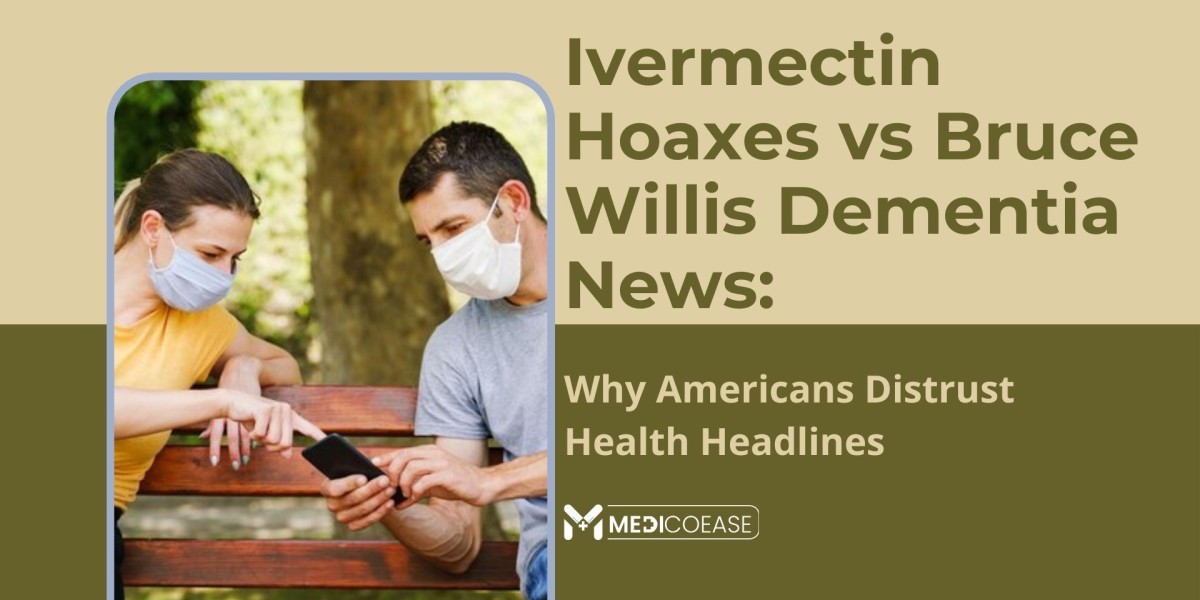In 2025, health headlines in the United States continue to shape public perception, but not always for the better. While Bruce Willis’s dementia news draws compassion and support, sensationalized ivermectin hoax stories dominate media cycles, muddying the waters of healthcare journalism. Americans are caught between celebrity health updates and ivermectin misinformation, leading to widespread skepticism about what’s real and what’s fabricated.
This article explores how ivermectin hoaxes overshadow dementia health news, why U.S. trust in healthcare reporting is fragile, and how misinformation—from Ivermectin overdose claims to Ivermectin cancer myths—distorts public understanding. With platforms like Wikipedia offering quick access to information but not always context, the need for credible journalism has never been greater.
? Bruce Willis Dementia Update Garners Public Sympathy
The announcement of Bruce Willis’s dementia progression made international headlines, stirring public empathy. His family’s openness has created conversations about neurodegenerative diseases like frontotemporal dementia and Alzheimer’s in mainstream culture. Unlike ivermectin myths, this news has been widely validated by medical experts, highlighting the difference between celebrity transparency and health media misinformation.
- Americans see dementia updates as genuine, heartbreaking stories.
- Advocacy groups are using Willis’s case to push for better dementia funding in the U.S. healthcare system.
- Yet, the media often pits these updates against viral ivermectin hoaxes, weakening trust in both.
? Ivermectin Hoaxes Dominate Headlines Alongside Celebrity Health
While Willis’s health struggles spark empathy, ivermectin myths compared with dementia updates dominate digital discourse. Headlines claiming miracle cures—such as ivermectin being a treatment for dementia or cancer—spread rapidly.
- Ivermectin overdose cases rose in the U.S. as self-medicating individuals bought unregulated forms online.
- Hoaxes link ivermectin with conditions like dementia, despite no clinical backing.
- FDA ivermectin warnings continue to remind Americans that unapproved uses are unsafe.
The celebrity news impacts ivermectin misinformation spread, as figures with large platforms amplify false claims without evidence. This has created a chaotic mix of sympathy-driven reporting and sensationalist hoax promotion.
?? U.S. Audiences Struggle With Mixed Healthcare Trust Signals
Healthcare trust in the United States has long been a fragile balance. Americans distrust health reporting after ivermectin claims, largely because:
- Contradictory headlines create confusion.
- Ivermectin COVID misinformation left lasting scars on public trust.
- Media outlets chase clicks, prioritizing sensationalism over accuracy.
The result? The average U.S. citizen doesn’t know whether to trust a dementia news update or to doubt it as another media ploy. This damages public faith not only in journalism but also in the healthcare system itself.
? Niclosamide and Fenbendazole in Alternative Celebrity Health Talk
As ivermectin remains controversial, Niclosamide and Fenbendazole are increasingly mentioned in alternative health spaces. Some celebrity-driven online forums push these drugs as miracle cures, tying them to everything from cancer to dementia without scientific backing.
- These drugs, like ivermectin, are repurposed in hoaxes.
- Wikipedia entries often clarify their medical use but can’t prevent misuse.
- Celebrity influence has exaggerated these narratives, blending celebrity health headlines mixed with ivermectin myths with dangerous alternative claims.
? Media Ethics Questioned in Coverage of Ivermectin Myths
Journalistic ethics are under the spotlight. When ivermectin hoaxes overshadow dementia health news, it raises critical concerns about responsible reporting.
- Should newsrooms give equal weight to celebrity updates and misinformation?
- Is fact-checking sufficient to counter viral myths?
- How should media balance U.S. trust in science with the need to report trending topics?
The failure to address these questions directly leads to audience disengagement and fuels distrust in the health media ecosystem.
? Celebrity Influence Fuels Health Misinformation Trends
Celebrities are powerful amplifiers of misinformation. When they endorse or even casually mention ivermectin or other drugs, audiences listen. Celebrity health headlines mixed with ivermectin myths become mainstream news, regardless of accuracy.
- Some influencers promoted ivermectin as a COVID treatment despite FDA ivermectin warnings.
- Celebrity speculation about dementia remedies drives clicks, not cures.
- The blend of dementia news and ivermectin hoaxes confuses public understanding of both.
This raises questions about accountability and the role of celebrity culture in shaping public health conversations.
? Experts Call for Fact-Checking in Healthcare Journalism
Medical experts are demanding stricter standards in health media. They argue that without fact-checking, headlines will continue to mislead Americans.
- Ivermectin online sales remain a growing problem, fueling self-medication.
- Only trusted platforms like Medicoease should be used for legitimate access to Ivermectin 6mg and Ivermectin 12mg, both under proper medical supervision.
- Fact-checking systems should compare claims against peer-reviewed data, FDA ivermectin guidance, and trusted resources like Wikipedia.
Without these measures, the cycle of misinformation will only deepen, especially as AI-driven media continues to accelerate headline generation.
? Comparing Ivermectin Hoaxes and Dementia News
When analyzing ivermectin myths compared with dementia updates, the differences are stark:
Category | Dementia News | Ivermectin Hoaxes |
Source | Verified medical experts, family statements | Unverified influencers, alternative blogs |
Impact | Raises awareness and funding | Fuels distrust and overdose cases |
Public Response | Sympathy and advocacy | Confusion, division, and skepticism |
The comparison highlights why U.S. audiences struggle with mixed healthcare trust signals—because credible news is being drowned out by misinformation.
❓ FAQ: Ivermectin Hoaxes vs Dementia News
Q1: Why do ivermectin hoaxes spread faster than dementia news?
A1: Hoaxes are often sensational and emotionally charged, making them more shareable on social media compared to genuine health updates.
Q2: Can ivermectin treat dementia or cancer?
A2: No. Despite ongoing Ivermectin cancer myths, there is no scientific evidence supporting its use in treating dementia, cancer, or other unrelated conditions.
Q3: Where can Americans safely purchase ivermectin?
A3: Only from trusted pharmacies such as Medicoease, which provides regulated access to Ivermectin 6mg and Ivermectin 12mg.
Q4: How did ivermectin become tied to COVID misinformation?
A4: During the pandemic, Ivermectin COVID claims went viral despite FDA ivermectin warnings, leading to dangerous misuse and overdoses.
Q5: What role do celebrities play in ivermectin misinformation?
A5: Celebrity endorsements amplify hoaxes, blending them with legitimate dementia news, and creating confusion among audiences.
? Conclusion
In today’s fast-paced media landscape, Americans are trapped between compassion-driven dementia news and sensationalist ivermectin hoaxes. This conflict illustrates why U.S. trust in healthcare journalism is at a breaking point. By holding celebrities accountable, prioritizing ethical reporting, and relying on verified pharmacies like Medicoease for safe access to Ivermectin 6mg and Ivermectin 12mg, the U.S. can begin to rebuild confidence in health narratives.
Until then, headlines will continue to be a battlefield where misinformation overshadows truth.






